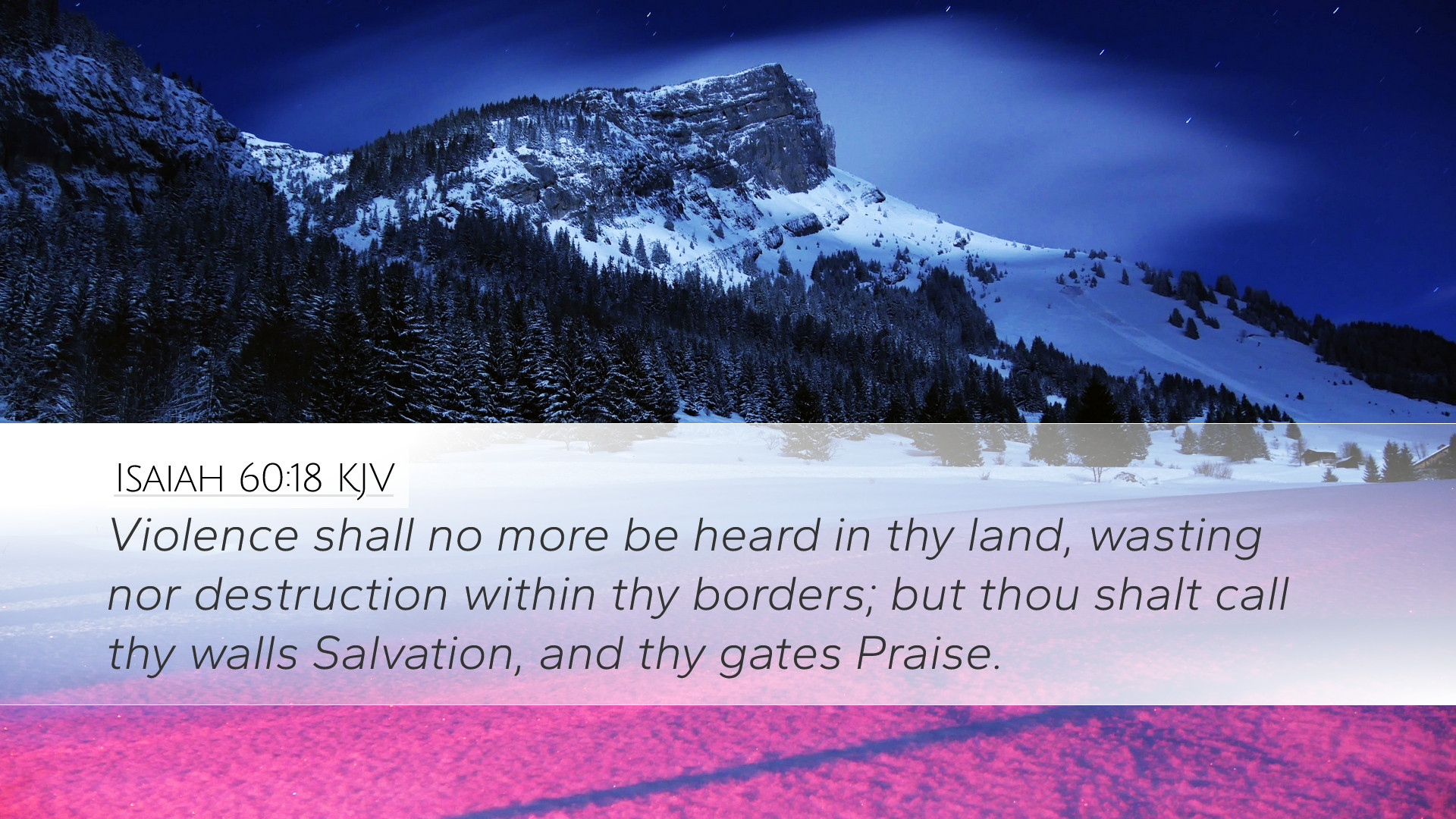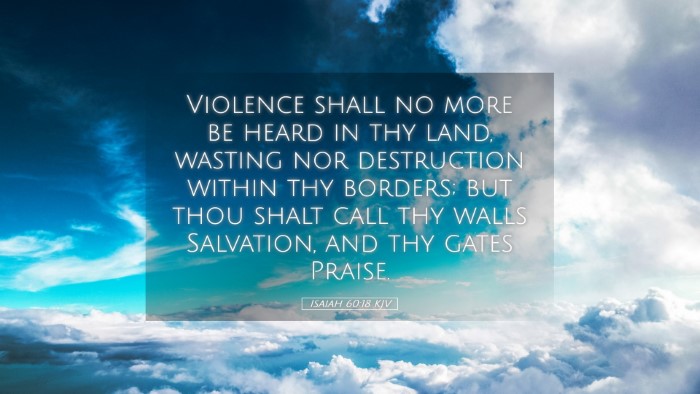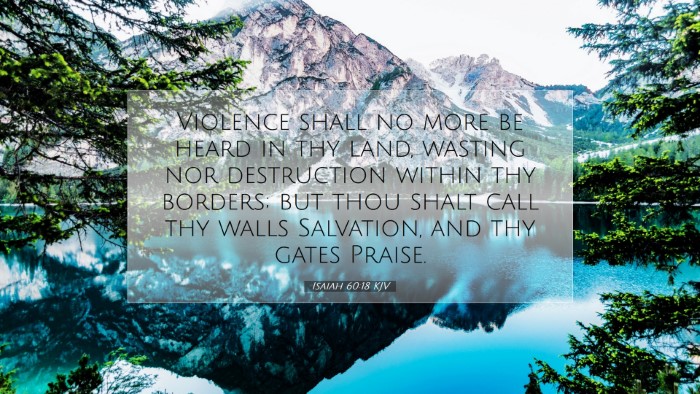Commentary on Isaiah 60:18
Isaiah 60:18 states, "Violence shall no more be heard in thy land, wasting nor destruction within thy borders; but thou shalt call thy walls Salvation, and thy gates Praise."
Introduction
Isaiah 60 embodies a prophetic vision of hope and restoration for the people of Israel. This verse captures the essence of God's promise of peace, security, and divine favor upon His people after a period of turmoil and strife.
Historical Context
The context of Isaiah 60 is critical for understanding its significance. Isaiah prophesied during a time of great upheaval for Israel, amidst foreign invasions and captivity. The promise of violence ceasing and destruction ending reflects the deep yearning for peace that characterized the Jewish experience.
Key Themes in Isaiah 60:18
- Absence of Violence: The opening phrase of the verse highlights a radical transformation wherein violence—a prevalent threat—will no longer plague the land. This signifies not only physical peace but also spiritual tranquility.
- Wasting and Destruction: The terms 'wasting' and 'destruction' reference the consequences of sin and rebellion against God, indicating a restoration of divine order where chaos once reigned.
- Salvation and Praise: The latter part of the verse suggests a new identity for the people of God. The walls, symbolic of security, shall be named 'Salvation,' and the gates, open to potential and opportunity, shall be known as 'Praise.'
Insights from Matthew Henry
Matthew Henry reflects on the profound implications of this verse, emphasizing that in the restored Jerusalem, there will be a complete absence of strife. He notes, "The blessings of the city are compared to those of the church." Henry elaborates that the new Jerusalem will experience the fulfillment of promises, where peace is the norm rather than a rare exception. He draws attention to the transformation that occurs in the hearts of believers, where they, like Jerusalem, become beacons of salvation and instruments of praise.
Insights from Albert Barnes
Albert Barnes provides a robust analysis of the implications of such peace in the context of God's covenant with His people. He points out that the absence of violence is indicative of God’s grace and mercy. Barnes states, "This is a promise of the restoration of Jerusalem in a state of perfect peace." He argues that this peace is not merely the cessation of war but the establishment of a thriving community devoted to worship. His interpretation underscores how the identity of God's people is intrinsically tied to their understanding of divine salvation and the ongoing call to praise God amid their circumstances.
Insights from Adam Clarke
Adam Clarke emphasizes the thematic shift in Isaiah 60:18 from despair to hope. He expounds on the metaphor of salvation—"Thy walls shall be called Salvation." Clarke argues that this metaphor illustrates the protective nature of divine salvation, which envelops the community like walls guarding against outside threats. Furthermore, he suggests that the gates named 'Praise' reflect the attitude of the populace, highlighting worship as a lifestyle—an invitation for all to enter into the fullness of God’s grace. Clarke’s commentary encourages readers to view their lives and communities through the lens of divine purpose and active engagement in praise.
Theological Implications
The theological significance of Isaiah 60:18 extends beyond its temporal context to encompass the believer's lived experience today. The absence of violence and destruction resonates with the New Testament's message of peace through Christ.
- Peace as a Divine Promise: The verse reinforces the New Testament theme that Christ is the Prince of Peace (Isaiah 9:6) and beckons believers to embody this peace in their lives.
- Community Identity: The naming of walls and gates speaks to a collective identity rooted in salvation and worship, challenging contemporary believers to foster communities reflective of God’s glory.
- Expectancy of Restoration: The promise of restoration encourages believers to anticipate the fullness of God’s kingdom, wherein justice and righteousness will prevail, eradicating all forms of violence and destruction.
Practical Applications
Pastors, students, and theologians can draw several practical applications from this verse:
- Promote Peace: Engage congregations in discussions about peacemaking, reflecting on personal and communal actions that align with God's call for peace.
- Encourage Hope: Use the transformative message of Isaiah 60:18 to inspire individuals and communities to look beyond their struggles and embrace the truth of God’s redemptive work.
- Foster Worship: Elevate the call to worship as a central aspect of community life, encouraging practices that recognize God's saving grace and promote an environment of praise.
Conclusion
Isaiah 60:18 invites believers into a rich understanding of God's redemptive narrative in which violence and destruction are replaced by salvation and praise. This promise resonates through generations, challenging God's people to seek peace, embody salvation, and live lives of worship. The insights from Matthew Henry, Albert Barnes, and Adam Clarke provide depth and clarity, offering invaluable resources for understanding the enduring significance of this remarkable verse.


